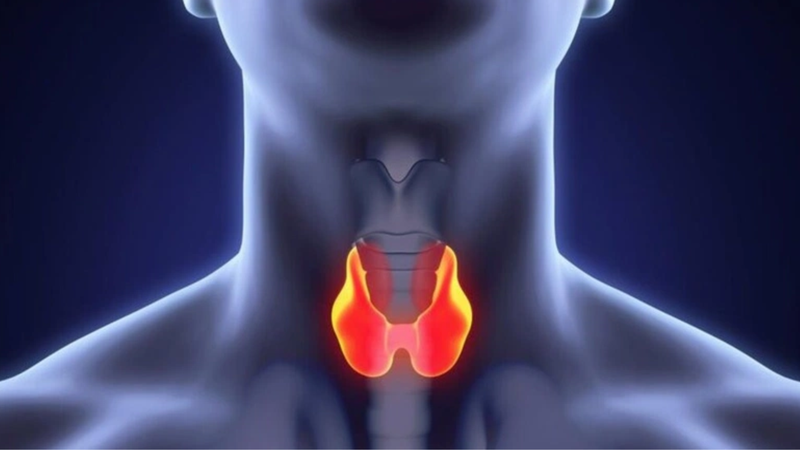Hyperthyroidism can make it difficult to perform everyday activities, such as writing, eating, and holding objects. This article will share information about the symptoms and treatments of hyperthyroidism.
What is hyperthyroidism?
The two hormones your thyroid produces that affect how your body functions are thyroxine (T4) and triiodothyronine (T3). Your thyroid gland controls things like how fast your heart beats and how quickly you burn calories. It releases hormones to control your metabolism (all the things your body does to turn food into energy and keep you going).
Hyperthyroidism is a condition in which your thyroid gland is overactive, producing too much thyroid hormone. This leads to increased metabolism in the body, causing many unusual symptoms such as: Rapid heartbeat, weight loss, fever, anxiety, restlessness, fatigue, dry skin, hair loss, goiter (enlarged thyroid gland).
Below are the main causes of hyperthyroidism such as:
- Graves’ disease: This immune system disorder is the most common cause of hyperthyroidism (70% of cases). Normally, antibodies in your blood attack bacteria, but if you have Graves’ disease, the antibodies activate your thyroid. This causes the gland to produce too much thyroid hormones T4 and T3. The cause of Graves’ disease is currently unknown, but it tends to run in families.
- Thyroiditis: An infection or immune system problem can cause your thyroid gland to swell and stimulate the thyroid. If this condition persists and is not treated properly, it can lead to hypothyroidism or hyperthyroidism. There are two types of thyroiditis: acute and chronic thyroiditis.
- Acute thyroiditis: This is a sudden and severe type of thyroiditis. It can cause symptoms such as fever, neck pain, neck swelling, and difficulty breathing. Acute thyroiditis can be caused by a viral or bacterial infection.
- Chronic thyroiditis: This is a long-term type of thyroiditis. It can cause symptoms such as fatigue, weight gain, constipation, and hair loss. Chronic thyroiditis can be caused by a number of things, including autoimmune diseases, infections, and exposure to radiation.
- Thyrotoxicosis: This is a condition where there is too much thyroid hormone in the body.
- Thyroid nodules: These are growths that develop in the thyroid gland.

Hyperthyroidism is a common syndrome caused by excessive increase of thyroid hormones.
Symptoms of Hyperthyroidism Hand Tremors
Hand tremor is a common and characteristic manifestation of hyperthyroidism. Hyperthyroidism is a condition in which the thyroid gland is overactive, producing too much thyroid hormone. Thyroid hormones affect many functions in the body, including the nervous system. When thyroid hormone levels are too high, it can cause overstimulation of the nervous system, leading to hand tremor.
Hand tremor due to hyperthyroidism usually occurs in the fingers, but can also affect the arms, forearms, and shoulders. Hand tremor is usually rapid (about 10-15 times per second), with a small amplitude. The severity of hand tremor can vary, from mild to severe.
In addition to hand tremors, hyperthyroidism can also cause other symptoms such as: rapid heartbeat, weight loss, fever, anxiety, restlessness, fatigue, dry skin, hair loss, goiter (enlarged thyroid gland)
If you have symptoms of hand tremors, especially combined with other symptoms of hyperthyroidism, see your doctor for timely diagnosis and treatment.

Hand tremors are a typical symptom of hyperthyroidism.
Treatment of Hyperthyroidism with Tremors
Thyroid hormone management plays an important role in controlling and reducing the symptoms of hyperthyroidism with tremor. There are three main methods of thyroid hormone management.
- Medication: Antithyroid drugs are the most common treatment for Graves’ disease. They help reduce thyroid hormone production and improve symptoms. Several other medications may also be used to treat hyperthyroidism, depending on the cause and severity of the disease.
- Radioactive iodine: Radioactive iodine kills thyroid cells, reducing thyroid hormone production. This method is often used for Graves’ disease that does not respond to medication or when the patient does not want to use medication.
- Surgery: Thyroidectomy is used when other treatments are ineffective or inappropriate. After surgery, the patient will need to take thyroid hormone supplements for life.
Lifestyle when having hyperthyroidism
In addition, changing your lifestyle plays an important role in supporting the treatment of hyperthyroidism and improving your overall health. Here are some changes you should make:
Diet:
- Limit foods rich in iodine: Iodine stimulates the production of thyroid hormones, so you should limit foods such as seafood, seaweed, and iodized salt.
- Provide enough vitamins and minerals: Eat lots of fruits, green vegetables, and whole grains to provide the necessary vitamins and minerals for the body.
- Drink enough water: Drinking enough water helps the body function effectively and supports metabolism.
Lifestyle:
- Get enough sleep: Getting enough sleep helps the body recover and reduce stress.
- Exercise regularly: Exercise helps improve health, reduce stress, and improve mood.
- Avoid stress: Stress can increase thyroid hormone levels, so you should find ways to relax such as yoga, meditation, and gentle exercise.
- Avoid stimulants: Limit the use of coffee, alcohol, and tobacco because they can increase anxiety levels and hand tremors.

Using medication is a way to treat hyperthyroidism hand tremors
Through the above article, we have provided all the information related to the symptoms and treatment of hyperthyroidism with hand tremors. Diagnosis of hyperthyroidism is very important, so if you have any symptoms related to the thyroid, you should go to a reputable medical facility for timely examination and diagnosis.





